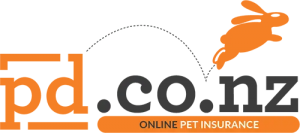
The Huntaway is our country’s only indigenous dog breed. This intelligent, black and tan working dog was bred for helping farmers herd sheep. A useful occupation, considering we have the densest population of sheep in the world!
But Huntaways don’t just make good herd dogs. If given enough exercise and stimulation, they’re great family pets and will thrive in the suburbs as much as on the farm. Let’s find out more about this top Kiwi dog.
Huntaway origins
As mentioned, the Huntaway was bred in New Zealand with the intention of herding sheep. It’s a cross between several different sheepdogs, including the Border Collie, Rottweiler and Labrador. The earliest mention of a Huntie was in a farmer’s advert in the Otago Daily Times in 1884 for a sheepdog “broken on rough country”.
The breed was recognised by the New Zealand Kennel Club in 2013. Due to the many variations of its size and coat colour, the Huntaway is not a showing dog.
→Related article: Dog Ownership in NZ: What You Need to Know
Key characteristics
The New Zealand Heading Dog is a medium to large pup with a muscular body and short, dense fur. They’re typically black and tan, with some sporting white or brindle colouration. The Huntie weighs between 25-40kg and is around 55-65cm in height.
In terms of personality, this working dog is incredibly intelligent, loyal, and affectionate. They’re good family dogs, comfortable with meeting new people, and sociable with other canines. The Huntie tends to form a very close relationship with their handler and will fiercely protect them if they’re ever in danger.
This breed has a lifespan of 12-14 years and is low maintenance when it comes to grooming. They do shed all year round, however, and will need more brushing in the spring and autumn.
The New Zealand Heading Dog is extremely trainable, and thrives when given a task to do with its handler. Thanks to its determination, strength and stamina, this working dog is able to patrol the vast terrains of Kiwi sheep country.
Exercise needs
Due to being a working dog, the Huntaway needs quite a lot of exercise and stimulation; we’re talking a minimum of 60 minutes a day. It’s advised to walk them daily, play with them regularly, and allow as much off-leash time as possible.
Hunties need a fair-sized yard they can play in. Make sure it’s well-fenced off, as they’re prone to escaping,
To further harness their energy and intelligence, you may want to enrol them in a dog class or group. There are many different organised dog sports, including clubs for dog agility in NZ, that they could do well in – especially fly-ball type sports.
If your lifestyle won’t allow you to give the Huntie the stimulation it needs, then you may have to consider another breed. Fortunately, there are plenty of other pups to consider.
→Related article: How to Select the Right Dog Breed for You
Huntaway health
The Huntaway is generally a robust, healthy dog, but it does have some potential health concerns you’ll want to be aware of:
Hip dysplasia
This can be one of their major problems, occurring when the hip joint has not formed correctly. It can cause hopping, limping and, in its advanced stages, lameness of the back legs.
Bone cancer
Unfortunately, this working dog is prone to bone cancer. It’s an aggressive condition that can spread throughout the body, causing other health issues. Signs include visible lumps, lameness or pain. However, if diagnosed early, your Huntie can get life-saving surgery to possibly remove the cancerous limb.
Ear infections
Due to its long ears and outdoor lifestyle, mud and dust can accumulate in the Huntie’s ears, which can lead to bacteria growth and infection. Signs of ear infections include head shaking, scratching, dark discharge and an odour. Take your pup to the vet if you notice anything.

About the author of this page
This report was written by Canstar Content Producer, Andrew Broadley. Andrew is an experienced writer with a wide range of industry experience. Starting out, he cut his teeth working as a writer for print and online magazines, and he has worked in both journalism and editorial roles. His content has covered lifestyle and culture, marketing and, more recently, finance for Canstar.
Enjoy reading this article?
You can like us on Facebook and get social, or sign up to receive more news like this straight to your inbox.
By subscribing you agree to the Canstar Privacy Policy







Share this article